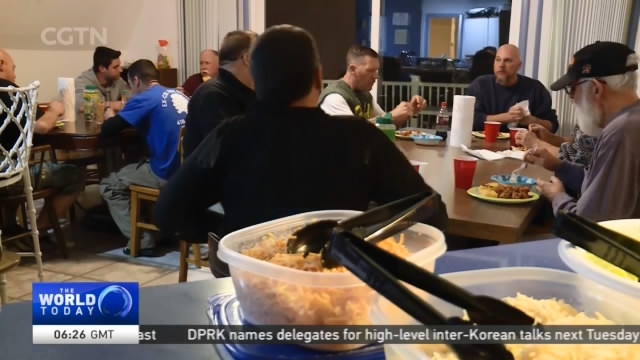
14:40, 07-Jan-2018
US Opioid Epidemic: Recovery centers on frontlines of deadly battle

China and the US announced more cooperation this week to battle the synthetic drugs that are killing more than 140 Americans every day. Their target is the chemicals to make fentanyl compounds.
The White House declared a public health emergency - but that designation is about to expire. CGTN's Giles Gibson reports from the frontlines of the war on drugs.
It looks like a normal suburban house, but this is the front line in America's battle against the opioid crisis. 16 men live here at Champ House Recovery in Bowie, Maryland, a non-profit group that offers a structured environment for men recovering from addiction. Champ House resident Jeff Ringler first tried heroin when he was just 17-years-old, and has been battling addiction for most of his adult life.
JEFF RINGLER CHAMP HOUSE RECOVERY RESIDENT "Once I'm in full blown addiction, I don't care about you, I don't care about anybody around me, I'm gonna do what I have to do, and I've got prison time to prove it, I've got the scars on my body. I'm gonna walk over you, I'm gonna rob your grandmother. I'm gonna whatever it takes."
Steve Clark volunteers at the house and says he's seen a big change in recent years.
STEVE CLARK, EXECUTIVE DIRECTOR CHAMP HOUSE RECOVERY "18 years ago, the majority of the men who came to the program here were alcoholics, with a little bit of drugs. In the last five or six years, we've seen a complete shift where probably it's reversed."
The state of Maryland alone saw a 20% increase in the drug overdose death rate from 2014 to 2015.
GILES GIBSON WASHINGTON "When he announced that 90- day health emergency period here in Washington, President Trump said the "federal government is aggressively fighting the opioid epidemic on all fronts."
But his critics in the healthcare industry say the administration's entire approach is wrong.
JOHN GORMAN, EXECUTIVE CHAIRMAN GORMAN HEALTH GROUP "The danger that we've got here and the reason that I say the 80s called and they want their drug war back, is that this administration just really seems committed to fighting an opioid war on the supply side - that is through interdiction, through law enforcement, through trying to raise the prices of these drugs on the street, which we know just doesn't work."
The men at Champ House are the lucky ones - residents like Jeff see transformations every single day.
JEFF RINGLER CHAMP HOUSE RECOVERY RESIDENT "The hope I get out of that is that I watch guys walk in and they'll just have this dead look about them, like life has no meaning, they have nothing, they're done. And then you see all of that came back to life, you see them a month, two months, three months later, you've got a whole new person in front of you, they're living, they've got a job and being productive, they have a life."
But with more than 30,000 deaths involving opioids in the United States in just 2015, success stories like that are simply a drop in the ocean of a much larger and fast-growing crisis. Giles Gibson, CGTN, Washington.

SITEMAP
Copyright © 2018 CGTN. Beijing ICP prepared NO.16065310-3
Copyright © 2018 CGTN. Beijing ICP prepared NO.16065310-3